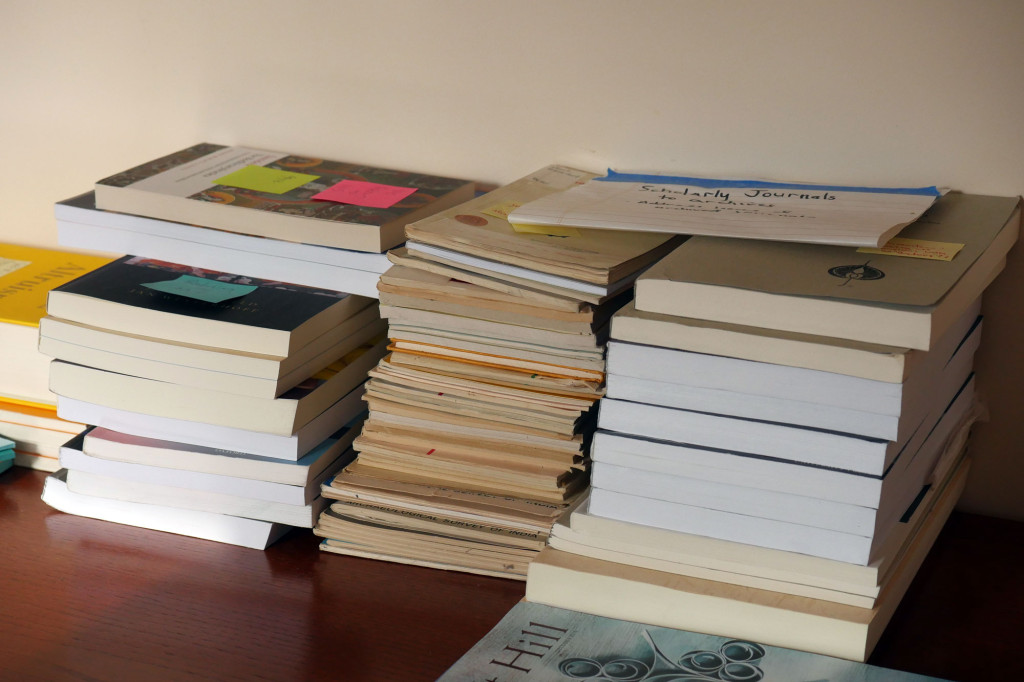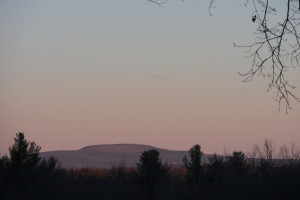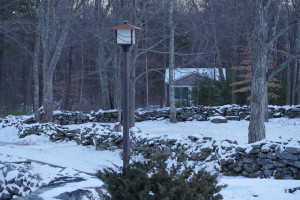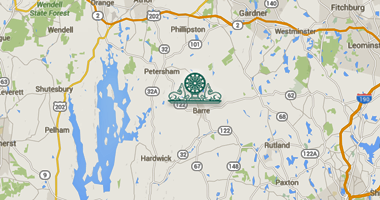Read Mu Soeng’s previous article introducing Psychological Homelessness and the Urban Hermit Ideal.

In the fall of 2013, I was fortunate enough to undertake a three-month meditation/writing retreat in a small cabin in Vermont. The cabin belongs to a friend who lives in a similar cabin next door. As it turned out, being in proximity to this friend (who I shall call Walter) and getting to know him a little better was perhaps the most rewarding part of my retreat.
Walter was inspired to experiment with how a modern-day Thoreau would create his own Walden Pond. He had enough savings to have a simple cabin built for himself that was aesthetically pleasing but wrapped in utter simplicity. The cabin has a loft but no bedroom—just a mattress that he unrolls at night.
Walter does not have a car or a computer or a television. No smartphone either, but plenty of shelves groaning with books. The only somewhat modern technology in his cottage is a land-line telephone, gas stove, and water heater. He has a typewriter on which he does his writing and a bicycle that he uses to visit friends and shop for groceries.
 With an inspired sense of generosity, Walter had another cabin built next to his own. He set up a program to allow artists and writers to come and spend a few days to work on their projects in this second cabin. He doesn’t accept any money for such stays and encourages those using the cabin to donate to a charity of their choice. He was kind enough to let me use the cabin for such a long period of time.
With an inspired sense of generosity, Walter had another cabin built next to his own. He set up a program to allow artists and writers to come and spend a few days to work on their projects in this second cabin. He doesn’t accept any money for such stays and encourages those using the cabin to donate to a charity of their choice. He was kind enough to let me use the cabin for such a long period of time.
I later found out that the local paper had done a profile on Walter in which it was asserted that he probably had the smallest carbon footprint of anyone in the entire state. The same profile also mentioned that in his will he had donated his two cabins to the local arts council so that artists could continue to use these places to do their work in seclusion.
Walter’s daily routine begins around 5am with sitting in silent vigil/prayer (he affiliates himself with the Unitarian Church), after which he has a simple breakfast of granola. The rest of his morning he spends quietly reading and writing. He skips lunch because, as he says, he “doesn’t need it.” His dinner consists of simple brown rice, tofu, and vegetables from the garden behind his cabin. His evenings are spent in quiet contemplation, and he goes to bed shortly after dark.
When I asked Walter if he considered himself a hermit, he said he preferred the word solitary because he was trying to engage with others in a more skillful way, not cut himself off from the world. He also attends the weekly meetings of the local Unitarian Church and helps out at a local food co-op.
Walter is in his early seventies and quite fit and healthy for his age. He had already been carving out his solitary existence for about twenty years when I got to know him. By my reckoning, he has succeeded in becoming a modern-day Thoreau.
Since I was working on a writing project on Buddha’s teachings on the training of a noble person, Walter’s embodiment of an urban hermit was much more resonant for me than I could have expected when I first made plans to go stay in the cabin. The biggest overlap between what Walter was doing and what was being proposed in Buddha’s teaching was the separation of needs from wants.
 William Powers, a senior fellow at the World Policy Institute, has recently taken on a leadership role in the global “Slow Movement.” As part of his own personal involvement in slowing down, he spent a season in a 12-foot-by-12-foot cabin off the grid in North Carolina. He wrote about his experiment in an award-winning memoir called Twelve by Twelve: A One-Room Cabin Off the Grid and Beyond the American Dream (2010). His follow-up experiment of living in a tiny apartment in Manhattan was motivated to a large extent by a somewhat angry question from a reader of the book. “It’s easy,” she had written, “to find minimalism, joy, connection to nature, and abundant time in a shack in the woods. But how the hell are the rest of us supposed to stay sane in our busy modern lives?”
William Powers, a senior fellow at the World Policy Institute, has recently taken on a leadership role in the global “Slow Movement.” As part of his own personal involvement in slowing down, he spent a season in a 12-foot-by-12-foot cabin off the grid in North Carolina. He wrote about his experiment in an award-winning memoir called Twelve by Twelve: A One-Room Cabin Off the Grid and Beyond the American Dream (2010). His follow-up experiment of living in a tiny apartment in Manhattan was motivated to a large extent by a somewhat angry question from a reader of the book. “It’s easy,” she had written, “to find minimalism, joy, connection to nature, and abundant time in a shack in the woods. But how the hell are the rest of us supposed to stay sane in our busy modern lives?”
So, Powers and his wife jettisoned 80 percent of their belongings and moved from their 2,000-square-foot townhouse in Queens, across the river to a 350-square-foot micro-apartment in Greenwich Village. Their attempt to live slowly and mindfully in frantic Manhattan is recounted in New Slow City: Living Simply in the World’s Fastest City (2014).
In many ways, the experiment conducted by the Powers in New York City provides a bookend to how Walter in Vermont has been experimenting with his own life. Both were seeking an answer to the same question: Is it actually possible to leave only the tiniest carbon footprint regardless of where you happen to be living? While Walter was inspired by Henry David Thoreau, Powers has spent two decades exploring the speed of American culture and its alternatives in some fifty countries around the world. He has been a leader in development and conservation movements in Latin America, Africa, and North America. But what makes Powers different from other writers on conservation and/or mindfulness is that he and his wife actually put their lives on the line.
Many years ago, I came to know two Westerners in their late thirties or early forties who had become students of a Tibetan lama. They and other like-minded people had pooled their resources to rent a big house in Toronto where they and their teacher could all live and practice. These two—a man and a woman, though not a couple—worked at the large postal sorting facility where I also worked for one summer.
They had chosen to work at the post office because sorting an unending mountain of mail was in many ways an ideal activity for continuing and deepening their meditation practice. Their value system was centered around ethical living in their small community of Buddhist practitioners—a simple life without television or any overt forms of entertainment.
These three narratives all have their own trajectories and unique worldviews and intentions, but together they create a space for the beginning of a conversation about the paradigm of an urban hermit. In many ways, such a conversation has been and continues to be taboo among philosophers and culture-shapers.
 An urban hermit is not an identity but a felt-sense of being in the world. A “felt-sense” is by definition both fluid and guided by one or more specific principles or questions. A case can be made that we all have a felt-sense of struggling to be at peace within ourselves regardless of the many ways in which our conditions and circumstances may differ. For many, the idea of solitude, of being alone for a short or long period of time, may be an appealing way to disengage from pressures that create and define the struggle to be at peace with ourselves in the first place.
An urban hermit is not an identity but a felt-sense of being in the world. A “felt-sense” is by definition both fluid and guided by one or more specific principles or questions. A case can be made that we all have a felt-sense of struggling to be at peace within ourselves regardless of the many ways in which our conditions and circumstances may differ. For many, the idea of solitude, of being alone for a short or long period of time, may be an appealing way to disengage from pressures that create and define the struggle to be at peace with ourselves in the first place.
The three narratives above all seem to have been informed by a desire, a need perhaps, for solitude. All of these people were aware, at some level, of the need to create some distance between their inner lives and the fragmentation produced by a chaotic social setting and work culture in a post-industrial society, particularly its American version in the late twentieth and early twenty-first centuries.
Krishnamurti, the famous Indian philosopher, has said,
To be alone is essential for man to be uninfluenced, for something uncontaminated to take place. For this aloneness there seems to be no time. There are too many things to do, too many responsibilities and so on. To learn to be quiet, shutting oneself in one’s room, to give the mind a rest, becomes a necessity. Love is part of this aloneness. To be simple, clear, and inwardly quiet is to have that flame. Things may not be easy, but the more one asks of life, the more fearful and painful it becomes. To live simply, uninfluenced, though everything and everyone is trying to influence, to be without varying moods and demands, is not easy, but without a deep, quiet life, all things are futile. (“Letters to a Young Friend,” 20)
Ivan Illich (1926-2002) was as an urban hermit of an altogether different type. He lived his life as a homeless intellectual and worked tirelessly to make the world a better place. Illich was born in Vienna to a Croatian Catholic engineer father and a Sephardic Jewish mother. He grew up speaking Italian, Spanish, French, and German. He later learned Croatian, ancient Greek, Latin, Portuguese, Hindi, and English. A brilliant scholar, he studied histology and crystallography at the University of Florence in Italy, and then theology and philosophy at the Pontifical Gregorian University at the Vatican.
 Despite his heavily-educated background, Illich became a highly-influential critic of institutionalized education. In his book Deschooling Society he advocated a system of self-directed education, opposing what he felt were deadening institutional restrictions. He also became a critic of international aid programs, which he saw largely as attempts to impose Western industrial hegemony on the developing world.
Despite his heavily-educated background, Illich became a highly-influential critic of institutionalized education. In his book Deschooling Society he advocated a system of self-directed education, opposing what he felt were deadening institutional restrictions. He also became a critic of international aid programs, which he saw largely as attempts to impose Western industrial hegemony on the developing world.
In 1951, he became a parish priest in Washington Heights, one of New York City’s poorest neighborhoods, then a barrio of freshly-arrived immigrants from Puerto Rico. In 1956, at the age of 30, he was appointed vice-rector of the Catholic University of Puerto Rico but was thrown out a few years later because of his loud criticism of Vatican positions on birth control and nuclear weapons.
In 1959, Illich traveled throughout South America on foot and by bus. In 1961, he founded the Centro Intercultural de Documentación (CIDOC or Intercultural Documentation Center), which became part language school and part free university for intellectuals and hippies from all over the Americas. Illich remained a Roman Catholic priest his entire life, continually criticizing the institutions of Western culture (including the Vatican) and their effects on education, medicine, work, energy use, transportation, and economic development.
Illich did not choose to spend his life in cloistered monasteries. His intellectual and vocational engagements were always in the midst of high-intensity urban areas. In the 1970s and 1980s, he became friends with Jerry Brown, the once and future governor of California, who described Illich’s life in these words:
[Illich] had no home of his own and relied on the hospitality of friends. He traveled from place to place with never more than two bags. He refused medical diagnosis, any form of insurance, and gave away whatever savings remained at the end of each year.
Among the serious thinkers I have had the privilege to meet, Ivan Illich alone embodied in his personal life as well as in his work a radical distancing from the imperatives of modern society. . . .
Ivan Illich was the rarest of human beings: erudite, yet possessed of aliveness and sensitivity. He savored the ordinary pleasures of life even as he cheerfully embraced its inevitable suffering. Steeped in an authentic Catholic tradition, he observed with detachment and as a pilgrim the unforgiving allure of science and progress. With acute clarity and sense of humor, he undermined, in all that he wrote, the uncontested certitudes of modern society.
In the last twenty years of his life, Ivan Illich suffered increasingly from a persistent growth on the side of his face, which he never treated, nor had diagnosed. In explaining why he voluntarily suffered, he said simply: “Nudum Christum nudum sequere.” I follow the naked Christ.
In what was his most provocative and perhaps final comment on the pursuit of health, Illich wrote: “Yes, we suffer pain, we become ill, we die. But we also hope, laugh, celebrate; we know the joy of caring for one another; often we are healed and we recover by many means. We do not have to pursue the flattening-out of human experience. I invite all to shift their gaze, their thoughts, from worrying about health care to cultivating the art of living. And, today with equal importance, the art of suffering, the art of dying. (Whole Earth Catalog, Spring 2003)
 An urban hermit is inspired to turn inevitabilities into art forms—the art of living, the art of being alone, the art of serving others, the art of dying—and to train himself or herself in orienting to life as an opportunity for learning, exploring, and seeing what is and what is not possible. One finds a principle or a question, an image or a feeling, and one follows it—wherever it might lead, however long it feels worth following.
An urban hermit is inspired to turn inevitabilities into art forms—the art of living, the art of being alone, the art of serving others, the art of dying—and to train himself or herself in orienting to life as an opportunity for learning, exploring, and seeing what is and what is not possible. One finds a principle or a question, an image or a feeling, and one follows it—wherever it might lead, however long it feels worth following.
Most of us have imagined what it would be like to live in a completely different way. We all seem to believe there’s something in particular waiting to be discovered in a deeper inner or outer solitude—the promise that there just might be a radically different way to depend on and relate to the world and one another.
Illich’s vision of the self in society mirrors what Martin Luther King once said during his “Beyond Vietnam” address at a New York City church in 1967: “We must rapidly begin the shift from a thing-oriented society to a person-oriented society. When machines and computers, profit motives and property rights, are considered more important than people, the giant triplets of racism, materialism, and militarism are incapable of being conquered.”
While Illich and King emphasized the participatory activity of self in society, Walter and Powers have leaned toward solitude and inward contemplation. The model of the urban hermit is a spectrum, not a fixed point. All who are so drawn will sketch out different maps and be guided by variously-constructed compasses. Regardless of the countless ways one may travel from point A to point B a single question is likely to guide and support all paths: What kind of sensitivity can I bring to the many pushes and pulls of greed, hatred, and delusion?


